| Listing 1 - 10 of 51 | << page >> |
Sort by
|
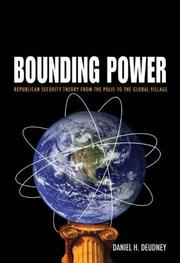
ISBN: 0691119015 9780691119014 0691138303 1282964585 1400837278 9786612964589 9781282964587 9781400837274 9780691138305 6612964588 9780691138305 Year: 2007 Publisher: Princeton, N.J. Oxford Princeton University Press
Abstract | Keywords | Export | Availability | Bookmark
 Loading...
Loading...Choose an application
- Reference Manager
- EndNote
- RefWorks (Direct export to RefWorks)
Realism, the dominant theory of international relations, particularly regarding security, seems compelling in part because of its claim to embody so much of Western political thought from the ancient Greeks to the present. Its main challenger, liberalism, looks to Kant and nineteenth-century economists. Despite their many insights, neither realism nor liberalism gives us adequate tools to grapple with security globalization, the liberal ascent, and the American role in their development. In reality, both realism and liberalism and their main insights were largely invented by republicans writing about republics. The main ideas of realism and liberalism are but fragments of republican security theory, whose primary claim is that security entails the simultaneous avoidance of the extremes of anarchy and hierarchy, and that the size of the space within which this is necessary has expanded due to technological change. In Daniel Deudney's reading, there is one main security tradition and its fragmentary descendants. This theory began in classical antiquity, and its pivotal early modern and Enlightenment culmination was the founding of the United States. Moving into the industrial and nuclear eras, this line of thinking becomes the basis for the claim that mutually restraining world government is now necessary for security and that political liberty cannot survive without new types of global unions. Unique in scope, depth, and timeliness, Bounding Power offers an international political theory for our fractious and perilous global village.
Political philosophy. Social philosophy --- History as a science --- Conservatism. --- Security, International --- Philosophy. --- Sécurité internationale --- Conservatisme

ISBN: 1588261689 1626373507 Year: 2003 Publisher: Boulder, Colorado ; London, [England] : Lynne Rienner Publishers,
Abstract | Keywords | Export | Availability | Bookmark
 Loading...
Loading...Choose an application
- Reference Manager
- EndNote
- RefWorks (Direct export to RefWorks)
Despite an array of predictions that Germany's foreign policy would be unable to adapt easily to the postunification, post–Cold War environment, it has in fact remained effective, even as it evolves in response to myriad challenges. Scott Erb analyzes German policy, with an emphasis on the transitions from 1980 to the present. Erb argues that Germany's success in dealing with a rapidly changing world rests on principles of multilateralism and cooperative institution building developed during the Cold War. These principles are especially well suited now, he finds, as interdependence and turbulence bring traditional notions of sovereignty and self-interest into question. Germany, he concludes, offers a sound model of foreign policy in an age of globalization.
International relations. Foreign policy --- Germany --- National security --- Security, International. --- Post-communism --- Sécurité nationale --- Sécurité internationale --- Postcommunisme --- Europe --- Allemagne --- Foreign relations --- Military policy. --- Relations extérieures --- Politique militaire --- Sécurité nationale --- Sécurité internationale --- Relations extérieures
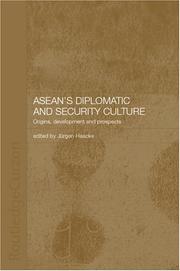
ISBN: 0700716521 9781136131462 1136131469 9780700716524 0203037537 9780203037539 9781136131547 9781136131622 9780415374170 113613154X Year: 2002 Publisher: Richmond Curzon
Abstract | Keywords | Export | Availability | Bookmark
 Loading...
Loading...Choose an application
- Reference Manager
- EndNote
- RefWorks (Direct export to RefWorks)
Member states of ASEAN - the Association of South-East Asian Nations - have developed a distinctive approach to political and security co-operation, which builds on the principles of sovereign equality, non-intervention and non-interference, quiet diplomacy, mutual respect, and the principle of not involving ASEAN in mediating bilateral disputes among the membership.
This book examines the origins of ASEAN's diplomatic and security culture and analyses how over time its key principles have been practised and contested as ASEAN states have responded to regional conflicts as well as challenge
Security, International. --- Sécurité internationale --- ASEAN. --- Asia --- Asie --- Foreign relations. --- Relations extérieures --- National security --- Association of Southeast Asian nations --- Southeast Asia --- Asia, Southeast --- Asia, Southeastern --- South East Asia --- Southeastern Asia --- Politics and government.
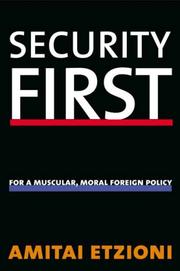
ISBN: 1281728780 9786611728786 0300138040 9780300138047 9780300108576 0300108575 9781281728784 Year: 2007 Publisher: New Haven Yale University Press
Abstract | Keywords | Export | Availability | Bookmark
 Loading...
Loading...Choose an application
- Reference Manager
- EndNote
- RefWorks (Direct export to RefWorks)
"Rarely have more profound changes in American foreign policy been called for than today," begins Amitai Etzioni in the preface to this book. Yet Etzioni's concern is not to lay blame for past mistakes but to address the future: What can now be done to improve U.S. relations with the rest of the world? What should American policies be toward recently liberated countries such as Iraq and Afghanistan, or rogue states like North Korea and Iran? When should the United States undertake humanitarian intervention abroad? What must be done to protect America from nuclear terrorism? The author asserts that providing basic security must be the first priority in all foreign policy considerations, even ahead of efforts to democratize. He sets out essential guidelines for a foreign policy that makes sense in the real world, builds on moral principles, and creates the possibility of establishing positive relationships with Muslim nations and all others. Etzioni has considered the issues deeply and for many years. His conclusions fall into no neat categories-neither "liberal" nor "conservative"-for he is guided not by ideology but by empirical evidence and moral deliberation. His proposal rings with the sound of reason, and this important book belongs on the reading list of every concerned leader, policy maker, and voter in America.
Security, International. --- Collective security --- International security --- International relations --- Disarmament --- International organization --- Peace --- United States --- Foreign relations. --- Security, International --- #SBIB:327.5H00 --- Strategie en vredesonderzoek: algemeen --- Sécurité internationale --- Etats-Unis --- Relations extérieures
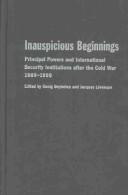
ISBN: 1282861565 9786612861567 077357154X 9780773571549 0773526250 9780773526259 0773526269 9780773526266 9781282861565 6612861568 Year: 2004 Publisher: Montreal McGill-Queen's University Press
Abstract | Keywords | Export | Availability | Bookmark
 Loading...
Loading...Choose an application
- Reference Manager
- EndNote
- RefWorks (Direct export to RefWorks)
The authors detail how the Bush and Clinton administrations relied on catering to allies and building large coalitions to deal with major international security challenges, while other principal powers were either pre-occupied with their domestic problems or deferred to the United States. As a consequence, on the eve of 11 September 2001 the United Nations Security Council remained an older, outmoded power configuration incapable of responding efficiently to the with novel challenges besetting it. Its relevance has been further questioned by the unilateral occupation of Iraq by the United States.
Security, International. --- Balance of power. --- World politics --- Sécurité internationale. --- Équilibre des puissances. --- Politique mondiale --- Power, Balance of --- Power politics --- International relations --- Political realism --- Collective security --- International security --- Disarmament --- International organization --- Peace --- Securite internationale. --- Equilibre des puissances.
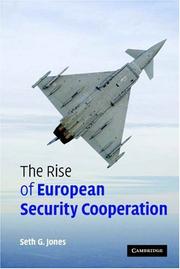
ISBN: 9780521689854 9780521869744 0511277172 9780511277177 0511277768 9780511277764 0521869749 0521689856 9780511491443 1107171385 1280850205 9786610850204 0511278373 0511491441 0511278977 0511320167 9780511278976 9780511278372 9781107171381 9781280850202 6610850208 9780511320163 Year: 2007 Publisher: Cambridge New York Cambridge University Press
Abstract | Keywords | Export | Availability | Bookmark
 Loading...
Loading...Choose an application
- Reference Manager
- EndNote
- RefWorks (Direct export to RefWorks)
One of the most striking developments in recent international politics has been the significant increase in security cooperation among European Union states. Seth Jones argues that this increase in cooperation, in areas such as economic sanctions, weapons production and collaboration among military forces, has occurred because of the changing structure of the international and regional systems. Since the end of the Cold War, the international system has shifted from a bipolar to a unipolar structure characterized by United States dominance. This has caused EU states to cooperate in the security realm to increase their ability to project power abroad and to decrease reliance on the US. Furthermore, European leaders in the early 1990s adopted a 'binding' strategy to ensure long-term peace on the continent, suggesting that security cooperation is caused by a desire to preserve peace in Europe whilst building power abroad.
Security, International. --- Sécurité internationale --- Europe --- Foreign relations --- Relations extérieures --- BPB0801 --- #SBIB:327.7H233 --- #SBIB:327.5H11 --- Europese Unie: externe relaties, buitenlands- en defensiebeleid (ook WEU) --- Collectieve veiligheid --- #SBIB:327.5H11Europese Unie: externe relaties, buitenlands- en defensiebeleid (ook WEU) --- Sécurité internationale --- Relations extérieures --- Collective security --- International security --- International relations --- Disarmament --- International organization --- Peace --- Security, International --- Social Sciences --- Political Science
Book
ISBN: 9780521122030 9780521199162 0521122031 0521199166 9780511676185 9780511679537 051167953X 9780511681516 0511681518 9780511677021 0511677022 0511676182 9786612536021 6612536020 1107205573 1282536028 0511678282 0511683499 9781107205574 9781282536029 9780511678288 9780511683497 Year: 2010 Volume: 113 Publisher: Cambridge, UK New York Cambridge University Press
Abstract | Keywords | Export | Availability | Bookmark
 Loading...
Loading...Choose an application
- Reference Manager
- EndNote
- RefWorks (Direct export to RefWorks)
How do once bitter enemies move beyond entrenched rivalry at the diplomatic level? In one of the first attempts to apply practice theory to the study of International Relations, Vincent Pouliot builds on Pierre Bourdieu's sociology to devise a theory of practice of security communities and applies it to post-Cold War security relations between NATO and Russia. Based on dozens of interviews and a thorough analysis of recent history, Pouliot demonstrates that diplomacy has become a normal, though not a self-evident, practice between the two former enemies. He argues that this limited pacification is due to the intense symbolic power struggles that have plagued the relationship ever since NATO began its process of enlargement at the geographical and functional levels. So long as Russia and NATO do not cast each other in the roles that they actually play together, security community development is bound to remain limited.
Security, International. --- Sécurité internationale --- North Atlantic Treaty Organization --- Russia (Federation) --- Russie --- Foreign relations. --- Relations extérieures --- Security, International --- Foreign relations --- Diplomacy --- Diplomacy. --- Security, International.North Atlantic Treaty OrganizationRussia (Federation)Foreign relations --- Sécurité internationale --- Relations extérieures --- Géopolitique --- Collective security --- International security --- International relations --- Disarmament --- International organization --- Peace --- North Atlantic treaty organisation --- NAVO --- OTAN --- Russia (Federation) - Foreign relations --- Social Sciences --- Political Science
Book
ISBN: 9780521872614 0521872618 9780521694223 0521694221 9780511651793 0511651791 9780511817762 1107197813 0511850670 0511817762 0511632576 0511631367 0511633777 9780511631368 9780511632570 9780511633775 9781107197817 9780511850677 Year: 2009 Publisher: Cambridge [U.K.] New York, N.Y. Cambridge University Press
Abstract | Keywords | Export | Availability | Bookmark
 Loading...
Loading...Choose an application
- Reference Manager
- EndNote
- RefWorks (Direct export to RefWorks)
"International Security Studies (ISS) has changed and diversified in many ways since 1945. This book provides the first intellectual history of the development of the subject in that period. It explains how ISS evolved from an initial concern with the strategic consequences of superpower rivalry and nuclear weapons, to its current diversity in which environmental, economic, human and other securities sit alongside military security, and in which approaches ranging from traditional Realist analysis to Feminism and Post-colonialism are in play. It sets out the driving forces that shaped debates in ISS, shows what makes ISS a single conversation across its diversity, and gives an authoritative account of debates on all the main topics within ISS. This is an unparalleled survey of the literature and institutions of ISS which will be an invaluable guide for all students and scholars of ISS, whether traditionalist, 'new agenda' or critical"--Provided by publisher.
876 Veiligheidspolitiek --- 814 Theorie van de internationale betrekkingen --- Security, International --- #SBIB:327.5H11 --- Collective security --- International security --- International relations --- Disarmament --- International organization --- Peace --- Study and teaching. --- Research. --- History. --- Collectieve veiligheid --- Security, Internationa --- Sécurité internationale --- Histoire --- History --- Research --- Study and teaching --- Polemology --- Social Sciences --- Political Science --- Security, International - Study and teaching --- Security, International - Research --- Security, International - History
Book
ISBN: 9780444532442 0444532447 9786613682420 1849505357 1280771658 9781849505352 9781280771651 661368242X Year: 2008 Publisher: Bingley, UK Emerald
Abstract | Keywords | Export | Availability | Bookmark
 Loading...
Loading...Choose an application
- Reference Manager
- EndNote
- RefWorks (Direct export to RefWorks)
Although all religions and cultures preach the gospel and virtues of peace, the history of mankind is the history of war and peace; millions have perished in international and domestic conflicts, and many wars have been fought on behalf of those same religions and people who call for peace around the world. During the 20th century, at the height of human civilization, we have seen two world wars and many devastating region conflicts. Although the last two decades have seen a prevalence of domestic, rather than international conflict, these have been as vicious and as destructive as any other war. Further, we are still facing the threat of nuclear confrontation, and a new kind of war - the war on terror - is also taking place.Although there is widespread desire for peace, there is no sustained advocacy of it by our political and cultural leaders. Citizens the world over have become more insecure because of international and domestic conflicts, genocide, terrorism, drug and criminal activities, weapons of mass destruction, pandemic threats of infectious diseases like Aids and HIV, natural disasters, poverty, resource constraints, climate change, threats to the international financial system, and much else. All these are interrelated at some level. In the name of international and domestic security, billions of dollars are wasted on unproductive military spending in both developed and developing countries, when millions are starving and living without basic human needs.This book contains a number of original articles relating to military spending, military industrial establishments, peace keeping, terrorism, environmental security and democratic peace, prepared by leading scholars in the field. Since we are living in a globalized world, global security rather than national security is the relevant issue. Global security must be consistent with and complimentary to a basic human security, which preserves freedom from threats to people's rights and safety. Because peace is not just the absence of violence. It is related to all the above issues - the socio-economic, political and physical environment of the world. Making this clear is the focus of the book.
Security, International. --- Peace-building. --- War. --- Sécurité internationale --- Consolidation de la paix --- Guerre --- Armed conflict (War) --- Conflict, Armed (War) --- Fighting --- Hostilities --- Wars --- International relations --- Military art and science --- Peace --- Building peace --- Peacebuilding --- Conflict management --- Peacekeeping forces --- Collective security --- International security --- Disarmament --- International organization --- Political Science --- Peacekeeping operations. --- Peacekeeping forces. --- Peace. --- Peacekeeping (Military science) --- Peacekeeping operations --- Armed Forces --- International police --- Peace-building
Book
ISBN: 9789004285408 9789004285415 9004285415 9004285407 1336207361 Year: 2015 Publisher: Leiden BRILL
Abstract | Keywords | Export | Availability | Bookmark
 Loading...
Loading...Choose an application
- Reference Manager
- EndNote
- RefWorks (Direct export to RefWorks)
In Mediterranean Paradiplomacies: The Dynamics of Diplomatic Reterritorialization , Manuel Duran presents a new view on the phenomenon of paradiplomacy by analyzing the diplomatic activities of a number of Mediterranean substate entities as a site of political territorialization. The international agency of these substate entities is giving way to new patterns of territorialization, as well as alternative forms of diplomacy. Duran examines the diplomatic activities of two Spanish, two French and two Italian regions. The book poses the question of why and how these regions operate diplomatically in a given territorial milieu and convincingly elucidates the particular patterns of reterritorialization that result from these diplomatic activities.
International relations. Foreign policy --- Mediterranean countries --- Security, International. --- Diplomacy. --- Sécurité internationale --- Diplomatie --- Relations extérieures --- Politique et gouvernement --- Mediterranean Region --- Foreign relations. --- Politics and government. --- Historiography. --- Political geography. --- Geography, Political --- Human geography --- Historical criticism --- History --- Authorship --- International relations --- Criticism --- Historiography --- Sécurité internationale --- Relations extérieures
| Listing 1 - 10 of 51 | << page >> |
Sort by
|

 Search
Search Feedback
Feedback About UniCat
About UniCat  Help
Help News
News